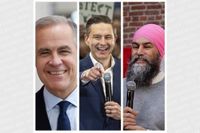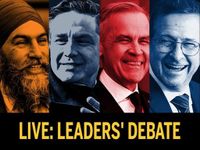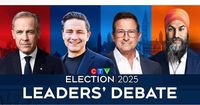In a pivotal moment for Canada’s political landscape, the leaders of the nation’s major federal parties faced off in the first nationally televised debate of the 2025 election campaign on April 16, 2025. This French-language debate, which began at 6 p.m. ET, was a crucial opportunity for candidates to sway undecided voters ahead of the upcoming election on April 28.
Taking center stage in Montreal were Liberal Leader Mark Carney, Conservative Leader Pierre Poilievre, New Democratic Party (NDP) Leader Jagmeet Singh, and Bloc Québécois Leader Yves-François Blanchet. The stakes were high, particularly for Carney, who is currently leading in the polls and thus likely to be a target for his opponents.
The debate was broadcasted live, with the National Post providing an English-dubbed version for viewers who may not speak French. This inclusive approach allowed a broader audience to engage with the political discourse, reflecting the diverse linguistic landscape of Canada.
As the debate unfolded, each leader was expected to address pressing issues facing Canadians. The Leaders' Debates Commission (LDC) had outlined five main themes for the French-language debate: the cost of living, energy and climate, identity and sovereignty, immigration and foreign affairs, and the ongoing trade war with the United States. These topics resonate deeply with voters, particularly as inflation and economic challenges continue to dominate discussions across the country.
In a notable twist, the Green Party, which has typically been a part of such debates, was uninvited just before the event due to a last-minute decision. The LDC stated that the Green Party had intentionally reduced its number of candidates for strategic reasons, which disqualified them from participating. This decision sparked discussions about representation and fairness in the electoral process.
Mark Carney, who is relatively new to the leaders' debate stage, faced scrutiny from his opponents, who aimed to capitalize on his inexperience. Poilievre, Singh, and Blanchet each sought to frame their arguments around the pressing themes of the debate, aiming to resonate with the electorate.
The English-language debate is set to follow on April 17, 2025, at 7 p.m. ET, where the themes will shift slightly to focus on affordability and the cost of living, public safety and security, and the potential threats to Canada.
Both debates are designed to be two hours long without commercial interruptions, emphasizing open dialogue and meaningful exchanges between the leaders. Moderated by seasoned journalists, the debates aim to provide voters with a clear understanding of each party's platform and vision for the future.
The LDC’s guidelines for participation in the debates require that political parties meet specific criteria, including endorsing candidates in 90% of Canada’s 343 ridings or having a current Member of Parliament in the House of Commons. These rules are intended to ensure that all parties represented in the debates have a substantial stake in the electoral process.
As Canadians prepare to head to the polls on April 28, the outcomes of these debates could significantly influence voter sentiment and decision-making. With a tight race anticipated, the performance of each leader in these debates may very well determine the direction of the country’s leadership.
In the lead-up to the debates, National Post reporters, including Catherine Lévesque, Antoine Trépanier, Christopher Nardi, and Ottawa bureau chief Stuart Thomson, provided live coverage and analysis, ensuring that voters remain informed and engaged in the electoral process.
The debates are not just a formality; they are a critical component of the democratic process in Canada, allowing voters to assess the candidates' positions and capabilities in real-time. As the nation grapples with significant issues, the leaders' ability to articulate their visions and respond to challenges will be under the spotlight.
In summary, the first televised debate of the 2025 Canadian election campaign marks a significant moment in the political arena, setting the stage for what promises to be a competitive and closely watched election. With the French-language debate concluded and the English debate around the corner, all eyes are on the leaders as they vie for the support of the electorate.






